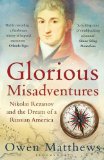Summary | Excerpt | Reviews | Beyond the Book | Readalikes | Genres & Themes | Author Bio

Nikolai Rezanov and the Dream of a Russian America
by Owen Matthews
It's hard to imagine today quite how extraordinary it was to see a Russian aristocrat and tsarist officers cast as heroes on a Sovietstage. The production also featured a vast icon of the Virgin looming over the actors, and haunting Orthodox liturgy. There were references to the 'Lord Emperor', and the tsarist flag was raised in triumph at the finale. The director, Mark Zakharov, was amazed when the censors passed the opera uncut. But Junona i Avos caught the mood of the moment. As Russians awoke to the disintegration of the Soviet empire, here was a nostalgic story of a lost empire in America. And as Gorbachev pressed for détente with the West, the romance of Rezanov and Conchita reminded us that love could cross national boundaries. Junona i Avos conjured up a romantic vision of pre-Soviet Russia even as audiences began to contemplate the reality of a post-Soviet Russia.
What impressed me most was that the story of Junona i Avos was largely true. Russia really did once have an American empire. By 1812 the border of the Tsar's dominions was on what is today called the Russian River, an hour's drive north of San Francisco along California's Highway 1. Russia also – briefly – had a colony on Hawaii. Rezanov spent much of his life passionately advocating the idea that America's west coast could be a province of Russia, and the Pacific a Russian sea. This was no mad pipe dream but a very real possibility.
As Rezanov set off from St Petersburg bound for the Pacific on a July morning in 1803, he was sailing into a world changing faster than ever in history. France, the greatest power in continental Europe, had recently been convulsed by revolution, but was now ruled by an upstart Corsican busy redrawing the map of the world. Napoleon had conquered – and then lost – Egypt, defeated Prussia and Spain and overrun Italy and much of Germany. He had even plotted with Russia's Tsar Paul to seize India from Britain.
The newly-founded British empire had been created by a couple of decisive battles and could, Napoleon wrote to Paul, be undone just as quickly. The memory of England's two great colonial coups was still only a generation old: in 1757 the British East India Company's General Robert Clive had broken the Mogul empire at the Battle of Plassey. Two years after that, Major General James Wolfe's daring attack on the fortress of Quebec ensured that the vast territory of New France, stretching across much of modern Canada, had come under the British crown.
It was an age of prodigies of conquest, navigation and empire-building. Napoleon had shown the way, but his alliance with Russia had collapsed with Tsar Paul's murder in 1801. Nonetheless, the time had come, Rezanov believed, for Russia to make her own move on the world stage. But her bold imperial gambit would be in the New rather than the Old World. Russia would colonize America from the west.
Rezanov's instrument was to be, like Clive of India's, a powerful private company. The Russian American Company, founded by Rezanov in 1799 with an exalted list of shareholders headed by the Tsar himself, was closely modelled on Britain's East India Company. It had a royal charter, the right to raise armies and dispense justice, and a trade monopoly designed to bring both dominion and profit.
Since the 1780s Russian merchant-adventurers had established a hold – albeit a precarious one – on the Pacific shore of America. A string of lonely stockades and forts manned by a motley array of convicts, fur trappers and foreign desperadoes spanned 4,000 miles of the northern Pacific rim from the Kamchatka peninsula through the Aleutian archipelago to the newly founded capital of Russian America at New Archangel – modern Sitka – at the southern end of the present-day US state of Alaska. Nonetheless Rezanov was convinced that the unclaimed 1,500 miles of territory that separated New Archangel from San Francisco was ripe for the taking – as was the sparsely populated and barely defended empire of New Spain that lay beyond.
Excerpted from Glorious Misadventures by Owen Matthews. Copyright © 2013 by Owen Matthews. Excerpted by permission of Bloomsbury USA. All rights reserved. No part of this excerpt may be reproduced or reprinted without permission in writing from the publisher.
The whole problem with the world is that fools and fanatics are always so certain of themselves, and wiser people ...
Click Here to find out who said this, as well as discovering other famous literary quotes!
Your guide toexceptional books
BookBrowse seeks out and recommends the best in contemporary fiction and nonfiction—books that not only engage and entertain but also deepen our understanding of ourselves and the world around us.